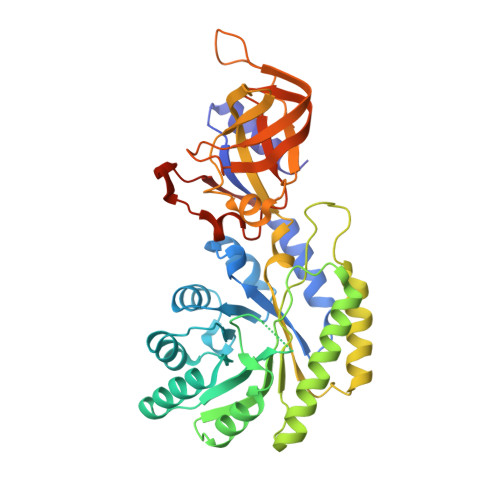Structural Insights into Substrate Recognition and Activity Regulation of the Key Decarboxylase SbnH in Staphyloferrin B Biosynthesis.
Tang, J., Ju, Y., Gu, Q., Xu, J., Zhou, H.(2019) J Mol Biology 431: 4868-4881
- PubMed: 31634470
- DOI: https://doi.org/10.1016/j.jmb.2019.10.009
- Primary Citation of Related Structures:
6KNH, 6KNI, 6KNK - PubMed Abstract:
Staphyloferrin B is a hydroxycarboxylate siderophore that is crucial for the invasion and virulence of Staphylococcus aureus in mammalian hosts where free iron ions are scarce. The assembly of staphyloferrin B involves four enzymatic steps, in which SbnH, a pyridoxal 5'-phosphate (PLP)-dependent decarboxylase, catalyzes the second step. Here, we report the X-ray crystal structures of S. aureus SbnH (SaSbnH) in complex with PLP, citrate, and the decarboxylation product citryl-diaminoethane (citryl-Dae). The overall structure of SaSbnH resembles those of the previously reported PLP-dependent amino acid decarboxylases, but the active site of SaSbnH showed unique structural features. Structural and mutagenesis analysis revealed that the citryl moiety of the substrate citryl-l-2,3-diaminopropionic acid (citryl-l-Dap) inserts into a narrow groove at the dimer interface of SaSbnH and forms hydrogen bonding interactions with both subunits. In the active site, a conserved lysine residue forms an aldimine linkage with the cofactor PLP, and a phenylalanine residue is essential for accommodating the l-configuration Dap of the substrate. Interestingly, the freestanding citrate molecule was found to bind to SaSbnH in a conformation inverse to that of the citryl group of citryl-Dae and efficiently inhibit SaSbnH. As an intermediate in the tricarboxylic acid (TCA) cycle, citrate is highly abundant in bacterial cells until iron depletion; thus, its inhibition of SaSbnH may serve as an iron-dependent regulatory mechanism in staphyloferrin B biosynthesis.
- Guangdong Provincial Key Laboratory of Chiral Molecule and Drug Discovery, School of Pharmaceutical Sciences, Sun Yat-sen University, Guangzhou 510006, China; Research Center for Drug Discovery, School of Pharmaceutical Sciences, Sun Yat-sen University, Guangzhou 510006, China.
Organizational Affiliation:

















